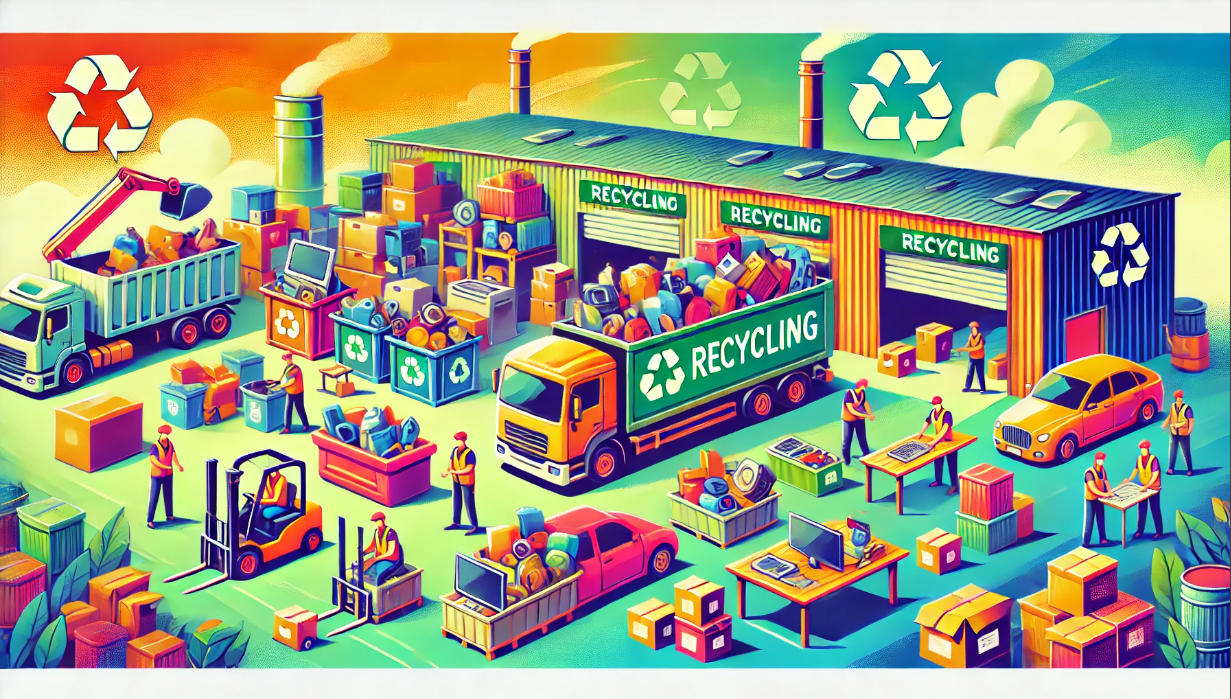
Recycling Unwanted Items: A Guide to Sustainable Junk Removal
In today's world, more people are recognizing the importance of recycling and reducing waste. When it comes to clearing out unwanted items from your home or office, simply tossing everything in the trash is no longer the best solution. By recycling unwanted items, you not only help the environment but also support sustainable practices that keep valuable materials in use.
In this guide, we’ll explore how to recycle common household and office items, the benefits of sustainable junk removal, and how junk removal services can help you ensure that as much as possible is recycled instead of sent to a landfill.
Why Is Recycling Unwanted Items Important?
Recycling is about much more than just reducing waste—it’s about conserving resources, protecting the environment, and reducing our carbon footprint. When you throw items in the trash, they often end up in landfills where they can take decades or even centuries to break down. On the other hand, recycling allows us to reclaim valuable materials and turn them into new products, which uses far fewer resources than manufacturing from scratch.
Key reasons to recycle your unwanted items:
- Reduce Landfill Waste: Landfills are filling up fast, and many materials can sit in them for years without breaking down. Recycling helps divert waste from landfills, reducing the strain on these facilities.
- Conserve Natural Resources: By recycling materials like glass, plastic, and metal, we can reduce the need to extract and process raw materials. This helps preserve ecosystems and conserve finite resources.
- Save Energy: Manufacturing products from recycled materials typically uses much less energy than creating new items from raw materials. For example, recycling aluminum saves about 95% of the energy needed to produce new aluminum.
- Fight Climate Change: By reducing the amount of waste that goes to landfills and lowering the demand for raw materials, recycling helps reduce greenhouse gas emissions, which contribute to climate change.
Common Household Items You Can Recycle
Many items around your home can be recycled, and some of them may surprise you. Here’s a list of common items that can often be recycled instead of thrown away:
1. Paper and Cardboard
Most types of paper and cardboard can be recycled, including newspapers, magazines, packaging, and even old books. Just make sure they are clean and free of food residue.
2. Glass Bottles and Jars
Glass is one of the most recyclable materials. Glass bottles, jars, and containers can be recycled over and over without losing quality. Rinse them out before recycling, and check if your local facility accepts colored glass.
3. Plastic Containers
Plastics marked with a recycling symbol (usually labeled 1 through 7) can often be recycled, but different types of plastic require different processes. It’s important to check your local recycling rules for specifics.
4. Metals
Aluminum cans, steel food cans, and other metal items like old cookware can be recycled easily. Metals can be melted down and used to create new products without losing their properties.
5. Electronics (E-Waste)
Old phones, computers, televisions, and other electronic devices contain valuable metals like copper and gold, as well as hazardous materials that need to be handled carefully. Recycling e-waste ensures that valuable materials are reclaimed and harmful components are safely disposed of.
6. Batteries
Batteries contain chemicals that can be harmful to the environment if not disposed of properly. Many recycling centers and retailers offer battery recycling programs.
| Benefit | Why It’s Important |
|---|---|
| Save Time | Allows landlords to focus on other tasks |
| Quick Turnaround | Faster property turnover, reducing vacancies |
| Avoid Heavy Lifting | Professionals handle difficult removals |
| Eco-friendly Disposal | Items are recycled or donated whenever possible |
| Cost-Effective | Saves money by minimizing vacancy time |
How to Recycle Electronics (E-Waste)
Electronics are some of the trickiest items to dispose of, but they are also some of the most important to recycle. Old electronics, or e-waste, contain a variety of valuable materials like metals, plastics, and even rare earth elements that can be reclaimed and reused. They also contain hazardous substances like lead, mercury, and cadmium, which can harm the environment if not handled properly.
Steps to recycle e-waste:
- Find an E-Waste Recycling Center
Many communities have special drop-off points or recycling events for e-waste. Check with your local government or electronics retailer for information on where to take your old devices. - Prepare Your Electronics
Before recycling, wipe any personal data from computers, phones, or other devices. This helps protect your privacy. Many recycling programs offer secure data wiping services as part of the process. - Recycle or Donate
Some electronics that are still in working condition can be donated or refurbished. Consider donating old computers or phones to local schools or non-profits if they are still usable.
What Happens to Recycled Materials?
Recycling doesn’t just make items disappear—it transforms them into new products. Here’s what happens to some common materials once they’re recycled:
- Paper: Recycled paper is shredded, mixed with water, and turned into a pulp. This pulp is cleaned and processed to remove ink and contaminants before being turned into new paper products.
- Glass: Recycled glass is sorted by color, cleaned, and crushed into small pieces called cullet. Cullet is then melted down and used to make new glass bottles and containers.
- Plastic: Recycled plastics are sorted by type, cleaned, and melted down to create pellets. These pellets can be used to manufacture a wide range of products, from new plastic containers to clothing made from recycled fibers.
- Metal: Recycled metals like aluminum and steel are melted down and reformed into new products. Aluminum, for example, is often used to create new cans or construction materials.
Benefits of Using Junk Removal Services for Recycling
Hiring a junk removal service can help streamline the recycling process, especially if you’re dealing with large quantities of items or don’t know where to take certain materials. Here’s why using a professional junk removal service can be beneficial:
1. Convenience
Instead of hauling everything to a recycling center yourself, a junk removal team will come to your home, pick up your unwanted items, and handle the recycling for you.
2. Eco-friendly Disposal
Many junk removal services prioritize recycling and donation over landfill disposal. They will sort through your items and ensure that as much as possible is recycled.
3. Knowledge of Local Recycling Rules
Different communities have different recycling rules, and knowing what can and can’t be recycled can be confusing. Junk removal professionals know the ins and outs of local recycling programs and ensure proper disposal.
4. Time-Saving
If you’re clearing out a home, office, or garage, dealing with large amounts of recyclables can be time-consuming. Junk removal companies take care of it quickly, freeing up your time for other tasks.
| Benefit | Why It Matters |
|---|---|
| Convenience | Junk removal teams handle all the lifting and sorting |
| Eco-friendly Disposal | Recycling is prioritized over landfills |
| Knowledge of Local Rules | Ensures compliance with local regulations |
| Time-Saving | Speeds up the recycling and decluttering process |
FAQ: Recycling Unwanted Items
Q1: Can I recycle old furniture?
Yes, many types of furniture can be recycled or donated. Wooden furniture can often be repurposed or broken down for recycling, and metal components like springs or frames can be recycled as well.
Q2: What should I do with old clothing?
If clothing is in good condition, consider donating it to a local charity or thrift store. If it’s worn out, some textile recycling programs can turn old fabrics into new products like insulation or carpeting.
Q3: Can I recycle all types of plastic?
Not all plastics are recyclable, but many common types (like those labeled with recycling symbols 1 through 7) can be recycled. Check your local recycling program for specific guidelines.
Q4: How do I know if my electronics can be recycled?
Most electronics can be recycled, but they need to be taken to an e-waste recycling center. Some retailers also accept old electronics for recycling.
Q5: Do junk removal services recycle everything they pick up?
While not everything can be recycled, many junk removal services make an effort to recycle as much as possible and will donate usable
Cities We Serve
Virginia Beach Local Resources
- Virginia Beach , VA
- Norfolk, VA
- Portsmouth, VA
- Chesapeake, VA
Dumpster Rental Sizes
Business Hours
- Mon - Fri
- -
- Sat - Sun
- Closed
All Rights Reserved | Johnny Bobby's Junk Hauling & Roll-Off Dumpsters
Powered By Junk Removal Money

